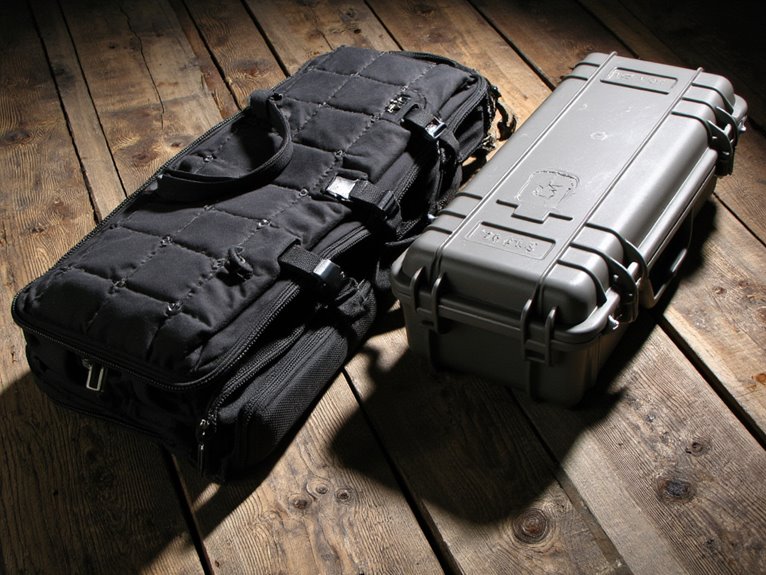Choosing the Right Gun Case: Soft Vs Hard
You’ll need hard cases for maximum protection, featuring rigid materials like high-impact plastic with custom foam interiors and IP67 waterproof ratings that withstand heavy impacts and moisture. Soft cases offer superior portability through lightweight nylon construction but provide only basic scratch protection and water resistance. Hard cases include advanced security features like biometric locks and reinforced construction, while soft cases rely on simple zippers. Your choice depends on whether you prioritize protection or convenience for your specific transport needs.
We are supported by our audience. When you purchase through links on our site, we may earn an affiliate commission, at no extra cost for you. Learn more. Last update on 27th December 2025 / Images from Amazon Product Advertising API.
Notable Insights
- Hard cases provide superior protection with rigid materials and waterproof seals, while soft cases offer basic scratch protection.
- Soft cases are lightweight and portable for easy transport, whereas hard cases are heavier but essential for airline travel.
- Hard cases feature advanced locking mechanisms and theft resistance, while soft cases rely on basic zippers and locks.
- Soft cases are budget-friendly with lower upfront costs, while hard cases require higher investment for premium materials and features.
- Choose soft cases for short trips and hunting, hard cases for long-distance travel and valuable firearm protection.
Protection Level Comparison
When selecting a gun case, the level of protection it provides should be your primary consideration, as this directly impacts your firearm’s safety and longevity.
Hard cases deliver superior protection levels through rigid case materials like high-impact plastic, aluminum, or metal construction. These materials resist drops, crushing forces, and severe impacts that would damage firearms in soft cases.
Hard cases offer unmatched firearm protection through durable materials that withstand impacts, drops, and crushing forces that destroy soft cases.
Soft cases use padding materials such as foam, nylon, or polyester but can’t match hard cases‘ protective capabilities. Hard cases often feature lockable mechanisms that provide additional security against theft.
You’ll find hard cases include custom foam interiors that immobilize firearms and absorb shock during transport. Soft cases protect against scratches and minor bumps but fail under heavy impacts or crushing pressure. Quality soft cases feature brushed Tricot lining that prevents moisture buildup and protects against surface damage.
For maximum protection during harsh handling or long-distance travel, hard cases provide the structural integrity your firearms need. Hard cases also offer improved waterproofing that becomes essential when facing unexpected weather conditions during outdoor excursions.
Many hard cases feature water-resistant material construction that protects firearms from moisture damage during unpredictable weather conditions.
Portability and Convenience
While protection remains paramount, the practical reality of transporting firearms demands equal consideration of portability and convenience factors.
Soft cases excel in weight reduction, using nylon construction and foam padding that’s noticeably lighter than hard case materials. You’ll appreciate the comfort features like adjustable, padded shoulder straps designed for extended carry sessions. Hard cases lack this ergonomic advantage, creating cumbersome transport scenarios.
Carrying methods differ considerably between options.
Soft cases offer flexible configurations—you can compress them when empty and utilize external accessory pockets. They accommodate scoped firearms through expandable construction.
Hard cases require pre-cut foam inserts and fixed dimensions that limit adaptability. For quick range access, soft cases provide faster handling with quieter operation.
However, hard cases deliver superior security through robust locking mechanisms, making them essential for airline travel despite convenience trade-offs.
Security Features
Security features represent the fundamental difference between basic storage and true firearm protection. You’ll encounter various security technology options depending on your case type and budget. Hard cases typically offer superior protection through reinforced construction and advanced lock types.
Modern security technology includes several key components:
- Biometric locks – Fingerprint access with 1-in-64-million false acceptance rates
- Keypad systems – 4-6 digit codes with scramble functions preventing password exposure
- Mechanical overrides – Backup key access when electronics fail
- Tamper alerts – Alarm systems detecting unauthorized access attempts
Hard cases feature 12-16 gauge steel construction with multiple one-inch diameter locking bolts. Advanced models include EMP-proof electronics and re-locking devices that activate during forced entry.
Soft cases rely primarily on zippers and basic locks, offering minimal security against determined theft attempts.
Environmental and Moisture Protection
Environmental protection capabilities determine whether your firearm emerges from storage in pristine condition or shows signs of corrosion and damage.
Hard cases excel with waterproof O-ring seals achieving IP67 submersion ratings. They create complete dust resistance through airtight barriers, preventing fine particles from infiltrating internal components. Desiccant compartments control humidity levels, while rust-inhibiting foam interiors actively prevent metal oxidation.
Soft cases offer basic water resistance through coated fabrics but can’t match hard cases‘ environmental sealing. Their fabric construction provides limited dust resistance, allowing particles to penetrate over time.
Moisture retention becomes problematic as neoprene and nylon materials absorb water, potentially accelerating corrosion. Hard cases maintain stable internal temperatures and include pressure release valves for altitude changes, ensuring extensive environmental protection.
Cost Considerations
Budget considerations often become the deciding factor when selecting between hard and soft gun cases, with prices spanning from $30 budget models to premium $1,000+ specialized designs.
Soft cases dominate budget options due to their nylon construction and minimal manufacturing complexity. Hard cases command higher prices through aluminum or composite materials plus integrated security features.
Price trends reveal distinct cost drivers across categories:
- Material expenses – Hard cases use costly impact-resistant plastics and metals
- Manufacturing complexity – Custom foam inserts and locking mechanisms increase production costs
- Security features – TSA-compliant locks and reinforced latches add premium pricing
- Capacity scaling – Multi-gun hard cases cost substantially more than single-gun soft alternatives
You’ll face a value proposition: pay more upfront for hard case durability or accept potential replacement costs with cheaper soft cases under heavy use. For those requiring permanent storage solutions, gun safes offer superior security features with models ranging from compact designs to high-capacity options with advanced locking mechanisms and fire protection. Quality 14-gauge steel construction provides enhanced durability and security compared to lighter-weight portable cases.
Use Case Suitability
Your specific use case determines whether you’ll need a soft case, hard case, or both types in your gear arsenal.
Travel distance plays a vital role – soft cases excel for local range trips within 30 miles, while hard cases become essential for cross-country transport or airline travel exceeding TSA’s firearm storage requirements.
Different activities demand distinct protection levels, and many firearm owners discover that maintaining both case types provides ideal flexibility for varying scenarios from competitive shooting to long-term storage.
Hard cases offer superior waterproof and dustproof protection against environmental factors, making them indispensable for outdoor hunting expeditions or storage in challenging conditions.
When transporting firearms during hunting season, bundled promotions often make it cost-effective to upgrade your protection setup alongside other gear purchases.
Travel Distance Considerations
When planning firearm transport, the distance you’ll travel directly determines which case type will serve you best. Short trips within your state typically require minimal protection, while cross-country journeys demand maximum case durability and strict adherence to travel regulations.
Hard cases excel for extended travel because they withstand airline cargo pressures, temperature fluctuations, and rough baggage handling. Their reinforced construction and TSA-compliant locking mechanisms meet federal transportation requirements. Soft cases work adequately for local trips but lack structural integrity for long-distance transport.
Consider these distance-based factors:
- Local travel (under 100 miles): Soft cases provide sufficient protection
- Interstate transport: Hard cases guarantee regulatory compliance
- Air travel: Only locked hard cases meet TSA standards
- International trips: Reinforced cases handle customs inspections
Your travel distance directly correlates with required protection levels. For secure storage during transport, consider that quality firearm carriers often feature adjustable retention systems similar to those found in high-end holsters, ensuring your weapon remains properly positioned throughout the journey. When traveling long distances, some gun owners prefer investing in permanent storage solutions like in-wall safes that provide secure home storage between trips.
Activity Specific Applications
Different shooting activities demand specific case characteristics that directly impact your firearm’s protection and your operational efficiency.
Hunting requires lightweight soft cases for extended carries, while their waterproof capabilities benefit waterfowl hunters. Hard cases excel during rugged terrain navigation where impact protection matters most.
Competitive shooters favor soft cases for range transport due to quick access compartments and reduced weight. However, precision firearms benefit from hard case protection during multi-day events. Air travel mandates TSA-approved hard cases exclusively.
Tactical applications demand flexibility. Soft cases offer discreet transport and MOLLE compatibility for gear attachment. Hard cases provide superior security and locking mechanisms for sensitive operations.
Casual users find soft cases economical for careful firearm handling situations.
Case maintenance requirements vary greatly—soft cases need frequent moisture checks while hard cases require minimal upkeep. Once stored securely, consider pistol racks for organized display and easy access within your gun safe or storage area.
Multi-Case Strategy Benefits
While single large cases offer centralized storage, implementing a multi-case strategy provides superior operational flexibility for firearm owners with diverse shooting needs. You’ll gain significant flexibility advantages by selecting only required firearms for specific activities without transporting your entire collection.
Individual cases weigh less and fit into confined spaces where large cases can’t, enabling discreet storage solutions.
Multi-case systems deliver enhanced organizational efficiency through weapon categorization. You can separate handguns, rifles, and shotguns for faster retrieval and preparation.
Key benefits include:
- Dedicated foam padding prevents firearm-to-firearm contact damage
- Custom inserts adapt to different configurations and sizes
- Individual locks provide case-specific security protocols
- Simultaneous access allows multiple users without conflicts
This approach optimizes transport efficiency while maintaining professional-grade protection standards for each weapon. Similar to wine storage systems, temperature control becomes essential when storing firearms in varying environmental conditions to prevent moisture damage and maintain optimal preservation. Multi-case strategies also complement shooting accessories like stability-enhancing bags that provide organized storage for range equipment and precision shooting gear.
Frequently Asked Questions
What Gun Case Materials Are Tsa-Approved for Airline Travel?
You’ll need hard-sided containers made from TSA regulations approved materials like hard plastic, polymer, or metal. Soft cases aren’t compliant alone, but polypropylene copolymer and stainless steel meet requirements.
Can I Use Silica Gel Packets to Control Moisture in Cases?
Yes, you can use silica gel packets for effective moisture control in gun cases. They’ll adsorb up to 40% of their weight in moisture, but guarantee your case seals tightly and replace packets regularly.
On a final note
You’ll need to match your case choice to your specific requirements. Hard cases excel when maximum protection and security are priorities, offering superior impact resistance and weatherproofing. Soft cases win for everyday transport, providing better portability and cost efficiency. Consider your firearm’s value, transport frequency, and environmental conditions. If you’re flying or storing expensive firearms, choose hard. For range trips and casual transport, soft cases often suffice.

